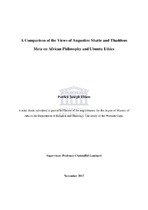A comparison of the views of Augustine Shutte and Thaddeus Metz on African philosophy and Ubuntu ethics
Abstract
In the theoretical study of Ethics much emphasis has traditionally been placed on established
ethical theories, via approaches typified e.g. as deontological, divine command, utilitarian,
virtue ethics and natural ethics. At UWC all these approaches, very much entrenched in the
Western academic canon, have been taught, together with ethical views carried by the world
religions. Over the last few years, however, an interest in the study of African ideas
(philosophy, theology, worldview studies, especially around the elusive but fascinating concept
of Ubuntu) has grown. This study is an attempt to make a contribution towards a more serious
exchange with African ethical ideas and their application in a global context.
In this mini-thesis I compare the views of two academics, Augustine Shutte and Thaddeus
Metz, who have actively and deliberately worked in the field of African philosophy and ethics.
Through this comparative study of two rather different readings of Ubuntu philosophy, I wish
to contribute to the growing interest in ethical views and discourse emanating from African
ways of looking at the world and at humanity. The well-known, recently deceased, Augustine
Shutte, a Catholic scholar of repute, taught Philosophy at the University of Cape Town, and
published books such as Philosophy for Africa, The Mystery of Humanity; Ubuntu, An ethic for
a New South Africa and The Quest for Humanity in Science and Religion, The South
African Experience. The other scholar, the American born philosopher Thaddeus Metz, started
teaching Philosophy at the University of Johannesburg and shifted his intellectual attention to
African ideas and ethics. Coming from a rational Kantian approach, mixed with utilitarian
ethical concerns, Metz discovered the difficulty of adding another “African mix” to main
stream academia, based on the comprehensive scope of the very inclusive look at what it means
to be human in the quite unique African worldview. He has published widely and in depth on
many aspects of this “clash of cultures” while also holding on to enlightenment ideals and an
ongoing conversation with science, especially also social science. These two authors thus share
many concerns and interests, but also represent two different angles and approaches into
African philosophy and ethics.
The question for this limited study is formulated in the short introduction: How do Shutte and
Metz connect the ethical implications of a widely shared “African worldview” with the core
idea of Ubuntu, and which ethical implications do they draw from their reading of Ubuntu –
for Africa and the world?
These questions are addressed via five chapters: In the first an introduction to the research
focus and question and the second of these the field of African Philosophy and Ethics is briefly
covered via appropriate literature, thus providing a framework for comparing Shutte and Metz.
The third chapter deals with Shutte’s search for an Ubuntu approach to South Africa’s
problems within the African and global context - via his emphasis on an inclusive anthropology
of caring and justice in which the pitfalls of individualism, materialism and consumerism can
be avoided while promoting a sustainable work ethos and attunement with “science”. The
fourth chapter focuses on Metz’ critical deontological approach, and his attempt to take the
comprehensive African worldview seriously in conversation with utility, reason and science.
In the fifth chapter the comparison of these two overlapping, but still quite different with an
approach that can lead to a concrete ethical conclusion and application for South Africa, Africa
and the world.

